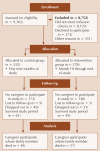Effect of an integrated cancer support team on caregiver satisfaction with end-of-life care
- PMID: 24969259
- PMCID: PMC4401575
- DOI: 10.1188/14.ONF.E248-E255
Effect of an integrated cancer support team on caregiver satisfaction with end-of-life care
Abstract
Purpose/objectives: To test the effectiveness of an interdisciplinary cancer support team (CST) on caregiver satisfaction with end-of-life (EOL) care for family members with advanced cancer.
Design: Quasi-experimental pre- and post-test tandem design.
Setting: Outpatient clinics of a comprehensive cancer center in urban Cleveland, OH.
Sample: 106 family caregivers.
Methods: Participants were enrolled into the control or CST group. Caregiver mood state and social support were measured at enrollment as well as at 3, 9, and 15 months, and satisfaction with EOL care was measured eight weeks after the patient's death.
Main research variables: Caregiver mood state, social support, and satisfaction with EOL care.
Findings: The intervention made no statistically significant contribution to caregiver mood state or perception of social support. The intervention group reported higher satisfaction with overall EOL care as well as five specific areas of EOL satisfaction (i.e., pain relief, information about managing pain, speed in treating symptoms, information regarding side effects, and coordination of care).
Conclusions: The CST yielded improved EOL satisfaction.
Implications for nursing: Although the emotional impact of an impending loss of a loved one may not change with the provision of support, perception that a loved one was well cared for in the terminal phase of illness may have long-range benefits through the grieving process. Investigation of the long-range effects of satisfaction with EOL care on the grieving process is warranted.
Keywords: cancer; end of life; family caregivers.
Similar articles
-
Family Functioning Predicts End-of-Life Care Quality in Patients With Cancer: Multicenter Prospective Cohort Study.Cancer Nurs. 2018 May/Jun;41(3):E1-E10. doi: 10.1097/NCC.0000000000000495. Cancer Nurs. 2018. PMID: 28426540
-
Oncology nurses' perceptions of obstacles and supportive behaviors at the end of life.Oncol Nurs Forum. 2009 Jul;36(4):446-53. doi: 10.1188/09.ONF.446-453. Oncol Nurs Forum. 2009. PMID: 19581235
-
Factors Predicting Bereaved Caregiver Perception of Quality of Care in the Final Week of Life: Implications for Health Care Providers.J Palliat Med. 2015 Oct;18(10):849-57. doi: 10.1089/jpm.2015.29001.hp. Epub 2015 Jul 17. J Palliat Med. 2015. PMID: 26186021 Free PMC article.
-
Environmental Design for End-of-Life Care: An Integrative Review on Improving the Quality of Life and Managing Symptoms for Patients in Institutional Settings.J Pain Symptom Manage. 2018 Mar;55(3):1018-1034. doi: 10.1016/j.jpainsymman.2017.09.011. Epub 2017 Sep 19. J Pain Symptom Manage. 2018. PMID: 28935129 Free PMC article. Review.
-
Telephone follow-up as a nursing intervention for patients receiving outpatient chemotherapy: integrative review.Rev Gaucha Enferm. 2019 Sep 23;40:e20190039. doi: 10.1590/1983-1447.2019.20190039. eCollection 2019. Rev Gaucha Enferm. 2019. PMID: 31553375 English, Portuguese.
Cited by
-
Understanding of Health-related Decision-making Terminology Among Cancer Caregivers.West J Nurs Res. 2021 Jul;43(7):649-659. doi: 10.1177/0193945920965238. Epub 2020 Oct 16. West J Nurs Res. 2021. PMID: 33063642 Free PMC article.
-
Improving information to caregivers of cancer patients: the Herlev Hospital Empowerment of Relatives through More and Earlier information Supply (HERMES) randomized controlled trial.Support Care Cancer. 2020 Feb;28(2):939-950. doi: 10.1007/s00520-019-04900-3. Epub 2019 Jun 8. Support Care Cancer. 2020. PMID: 31177391 Clinical Trial.
-
Psychoeducational Interventions for Caregivers of Persons With Multiple Sclerosis: Protocol for a Randomized Trial.JMIR Res Protoc. 2021 Aug 26;10(8):e30617. doi: 10.2196/30617. JMIR Res Protoc. 2021. PMID: 34435971 Free PMC article.
-
Exploring the ethical decision-making experience of caregivers of end stage cancer patients in Iran: a phenomenological study.BMC Med Ethics. 2024 Nov 15;25(1):130. doi: 10.1186/s12910-024-01131-y. BMC Med Ethics. 2024. PMID: 39543594 Free PMC article.
References
-
- American Cancer Society . What you need to know as a cancer caregiver. Author; Atlanta, GA: 2014.
-
- Aoun S, Bird S, Kristjanson LJ, Currow D. Reliability testing of the FAMCARE-2 scale: Measuring family carer satisfaction with palliative care. Palliative Medicine. 2010;24:674–81. doi:10.1177/0269216310373166. - PubMed
-
- Cameron JI, Franche RL, Cheung AM, Stewart DE. Lifestyle interference and emotional distress in family caregivers of advanced cancer patients. Cancer. 2002;94:521–527. doi:10.1002/cncr.10212. - PubMed
-
- Cella DF, Bonomi AE, Lloyd SR, Tulsky DS, Kaplan E, Bonomi P. Reliability and validity of the Functional Assessment of Cancer Therapy-Lung (FACT-L) quality of life instrument. Lung Cancer. 1995;12:199–220. doi:10.1016/0169-5002(95)00450-F. - PubMed
Publication types
MeSH terms
Grants and funding
LinkOut - more resources
Full Text Sources
Other Literature Sources
Medical


